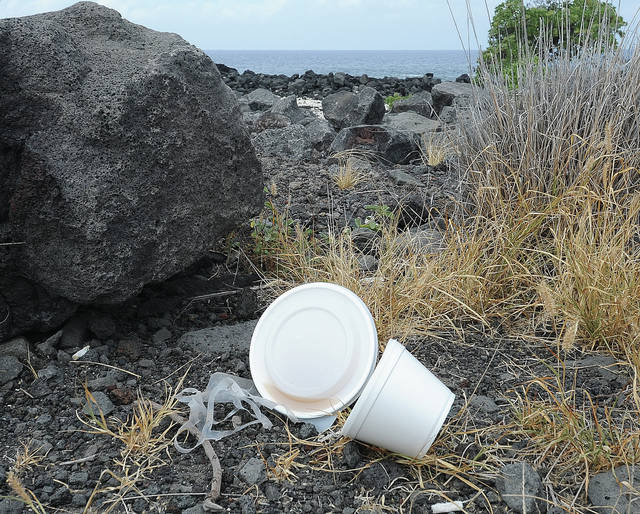Those foam food to-go containers? Soon to be gone.
A polystyrene food container ban took a big leap forward Thursday, when the County Council moved a bill to its final reading.
The council voted 7-2 to approve Bill 13 on first reading. A second reading will be held later this month.
The ban, which covers what is popularly known as “Styrofoam” plate lunch containers, coffee cups and soup bowls, has taken several forms over the past two years, overlapping two council terms, taking two trips to the Environmental Management Commission and discussed at length in two task forces.
“It’s a first step,” said Puna Councilwoman Eileen O’Hara, sponsor of the bill.
“This is a responsible piece of legislation that takes a toxic product out of our environment and out of the food we eat,” added Puna Councilwoman Jen Ruggles.
Two council members who have been dubious in the past said the bill has been improved enough that they can also support it.
“This has been an exercise in compromise,” said Kohala Councilman Tim Richards.
“Doing something is better than doing nothing, especially on this bill and my constituents agree,” said Kona Councilman Dru Kanuha.
Two council members were steadfast in their opposition.
“This bill in my opinion .. is blatantly unfair,” said Hilo Councilman Aaron Chung. “It offends my sense of fairness because it singles out a certain class of people and that’s food vendors. … It’s a sad commentary that we’re going to blame food vendors for littering. … We pick on the little guys.”
Hilo Councilwoman Sue Lee Loy agreed. She said she wants to see incentive-style legislation rather than a “stick.”
“It’s not about killing fish, it’s about making sure we have fair legislation,” Lee Loy said. “We’re legislating a choice. … When we start legislating people’s choices, it’s a dictatorship.”
Supporters were legion among testifiers, including emails and petitions signed by hundreds, as well as video testimony from Jean-Michel Cousteau.
Douglas McCauley, assistant professor of marine science at the University of California at Santa Barbara and director of the Benioff Ocean Institute, said he’s done a great deal of study around the Hawaiian Islands.
Danger to sea life is two-fold with polystyrene and other plastics, he said. First is the mechanical problem when the material chokes sea life or causes internal obstruction. The other is chemical contamination, he said.
“They have no biological experience with plastics,” McCauley said of the marine life.
Opponents contend polystyrene isn’t the problem; litter is. They said replacing foam food containers with compostable ones will cost more, and won’t achieve the desired purpose until the county builds a composting facility.
“Polystyrene has been approved by the Food and Drug Administration for over 50 years,” said Dante Carpenter, a former county councilman, state senator and mayor who now is a consultant and a director of Pacific Waste Inc.
“Simply put, the problem is inadequate litter control,” he said.
O’Hara disagreed.
“We have on the books laws against littering since as long as I could remember and we’ve never handed out a ticket,” she said.
If passed and signed by the mayor, Bill 13 would go into effect July 1, 2019, with an educational program initiated that January. The county Department of Environmental Management will first write rules to enforce the measure.
Fines range from $10 to $600 per violation, depending on whether the violation is part of a special event and the size of the special event. A written warning will first be issued. Each sale or transfer of food in a polystyrene container counts as a single violation.
The bill as written exempts ice chests and coolers, county facility users and food vendors with county approval and providers of supplies during county emergencies declared by the mayor. Food packaged outside the county, and packaging for raw meat, fish, and eggs that have not been further processed are also exempt.
In situations where compliance with the ordinance would result in undue hardship, the Environmental Management director may exempt a food vendor or county facility user from the requirements for a period not to exceed 180 days, under the bill.






